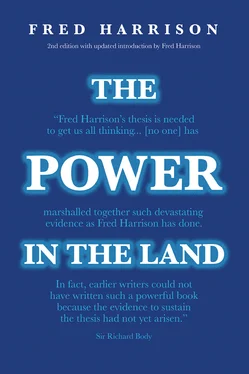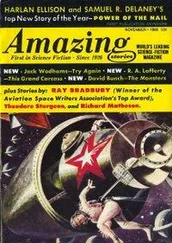The debate about capitalism as a mode of production, therefore, has been in the terms validated by Adam Smith. But contrary to what he thought he was doing — and his readers interpreted him as doing 1 —Smith developed an economic framework which entailed a fatal element of monopoly power. He wrote about an ‘invisible hand’ guiding the system to the benefit of everyone, but he recommended the preservation of a structure of property rights which by its very nature struck at the heart of individual liberty and economic prosperity.
Critics, then, are opponents of Adam Smith — not of laissez faire. For the freely competitive market system with a capitalistic ethos has yet to be put to trial. Responsibility for the slums of Bolton in the 19th century, and the hunger of the Jarrow marchers in the 20th century, must be laid at the feet of Adam Smith and the politicians and practitioners who happily accepted his values; these tragedies, as we shall see, are not a necessary part of laissez faire capitalism. The search for a system which combines personal freedom and social stability with economic prosperity for everyone is a realisable dream, and its pursuit must start with an analysis of the defects in the philosophical justification advanced to legitimise the history of western industrial society: The Wealth of Nations.
Dr Smith was a careful Scottish scholar. He had taught at the University of Edinburgh, travelled to France where he studied the Physiocratic system of economics, and was an accomplished logician and natural scientist. His great book was not specifically prepared for the Industrial Revolution which was fermenting all around him. He wanted to define the principles of a free and just economic system of relevance to any civilized society. Indeed, surprisingly, he was not well acquainted with the great strides in mechanical inventions which characterised the two decades during which he wrote the book which he published in 1776. 2
The clues to Smith’s fatal errors were contained in his first book, The Theory of Moral Sentiments (1759), 3 which was a discourse on ethics. In this, he distorted the way in which income was divided between the landlords and the landless. In doing so, however, he linked ‘the invisible hand’ with the process, and the free market was generally held to be guilty of what subsequently happened.
Smith knew the facts. The natural fertility of the earth, nurtured by human labour, increased the output that fed a greater multitude. But, he insisted:
It is to no purpose that the proud and unfeeling landlord views his extensive fields, and without a thought for the wants of his brethren, in imagination consumes himself the whole harvest that grows upon them. The homely and vulgar proverb, that the eye is larger than the belly, never was more fully verified than with regard to him. 4
Smith insisted that, given the limited capacities of the landlord’s belly, he was obliged to ‘distribute’ his surplus food. The rich ‘consume little more than the poor; and in spite of their natural selfishness and rapacity... they divide with the poor the produce of all their improvements’. Underpinning the whole structure of Adam Smith’s economics was this naive claim that landlords shared the surplus output among every person in society; more than that, however, the distribution was effectively an equal one. Of landlords, he said:
They are led by an invisible hand to make nearly the same distribution of the necessaries of life which would have been made had the earth been divided into equal portions among all its inhabitants; and thus, without intending it, without knowing it, advance the interest of the society, and afford means to the multiplication of the species. 5
So land redistribution was not on the agenda of reforms that might be necessary to improve the new mode of production. For ‘the invisible hand’ ensured that people enjoyed ‘nearly the same distribution’ as if the earth had been divided into equal portions among all.
Smith insulated the landlords from criticism by claiming that they were not responsible for the existing distribution of property rights, and that in any event nobody was really excluded from a share of wealth:
When providence divided the earth among a few lordly masters, it neither forgot nor abandoned those who seemed to have been left out in the partition. These last, too, enjoy their share of all that it produces. In what constitutes the real happiness of human life, they are in no respect inferior to those who would seem so much above them. In ease of body and peace of mind, all the different ranks of life are nearly upon a level, and the beggar, who suns himself by the side of the highway, possesses that security which kings are fighting for. 6
All was well, then; the ‘fitness’ of the system was bestowed with a certain ‘propriety and beauty’ 7 that was the free market.
Smith appears to confuse the differences between the division of the products of the earth, with the value of that output as it is exchanged across the stalls in the market towns. Landlords may not hoard all the food that is grown on their land; but nor do they distribute its value on a nearly equal basis, as Smith would have us believe — as any landless beggar sunning himself on the side of the highway could have told the young Professor of Moral Philosophy from Glasgow.
Adam Smith was not a fool, and his attention to detail was meticulous. So we can account for the apparent shallowness of his economic reasoning only in terms of his having to fit reality to his theory. He must, at the outset, have decided that property rights to land should not be distributed in the new industrial system. In doing so, he was hamstringing capitalism.
In The Wealth of Nations , 8 Smith attacked the manufacturers who sought to monopolise markets in order to inflate the price of their products; yet while he recognises that rent was a monopoly price for the use of a finite resource, he did not recommend any action to destroy that particular monopoly. He acknowledged that ‘perfect liberty’ was associated with the need to allocate capital and labout to their most efficient uses, to maximise the output of goods at the lowest possible prices; yet he condoned the under-use or misallocation of land. In sum, then, he expected labour and capital to work their damndest to maximise the welfare of society; yet he sought to protect the landlords, whose income and property rights were not to be invaded for the sake of improving the operations of ‘the invisible hand’.
The theoretical formulations in The Wealth of Nations could have been used to predict the tragedies which would consequently afflict industrial society. For he offered a perfectly clear hypothesis about the determination of economic rent, containing all the elements of the theory which was later to be popularly associated with the name of David Ricardo. With this theory, Smith predicted that progress was biased in favour of the landlord class.
... every improvement in the circumstances of the society tends either directly or indirectly to raise the real rent of land, to increase the real wealth of the landlord, his power of purchasing the labour, or the produce of the labour of other people. 9
Anticipating Henry George's formulations on the distribution of national income by over a century, Smith even noted that ‘The real value of the landlord's share, his real command of the labour of other people, not only arises with the real value of the produce, but the proportion of his share to the whole produce rises with it'. 10 Smith was under no illusions that rent was an unearned income; and here he acknowledges that it was a rising proportion of national wealth, a fund which lent itself peculiarly well to finance those activities that were suitable candidates for public sector expenditure.
Читать дальше












